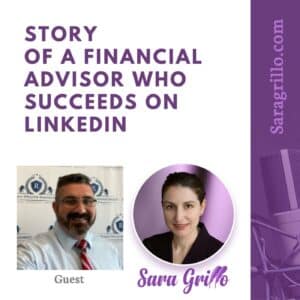Podcast: Play in new window | Download
In today’s show we have Steve Wershing, President of the Client Driven Practice, to talk about financial advisor client feedback. We’ll talk about whether or not you should ask, and discuss some methods of asking for feedback from clients that will minimize the amount of pain inflicted.
But before we get into it, for those of you who are new to my blog/podcast, my name is Sara. I am a CFA® charterholder and I used to be a financial advisor. I have a weekly newsletter in which I talk about financial advisor lead generation topics which is best described as “fun and irreverent.” So please subscribe!
Should you solicit feedback from your clients?
Let’s face it: Nobody likes being judged.
It’s almost like that part on Survivor where there’s one person that gets voted off the island. No matter how thick-skinned you are, it’s always a leeeeeetle bit of a jolt.
You may be in the very small percentage of financial advisors who never lose a client, are immune to the threat of the competition orbiting around your clients, or who don’t care about improving your clients’ experience.
If you are, then please leave this website because this blog isn’t for you. Bye!
But, if you do want to improve the experience that your clients have, you have to ask them for feedback because otherwise you’re just trying to read minds and unless you are clairvoyant you’d be just making assumptions.
Making assumptions is worse than not asking, by the way. Just assuming you know what’s on someone’s mind because you have worked with them for a long time is wrong. You may think you know, but that’s different from asking. You’re only getting a part of the picture.
Now, many advisors don’t solicit feedback on purpose because they don’t want to know. If this is you, get some courage up. Maybe watch Rocky IV a few times first, that can help.
The purpose is to understand what it’s like to work with you, from the other side of the table. That way you can identify what is most valuable and how you can improve it.
Now that we’ve established what feedback is and why you should ask for it, let’s talk about how to get it done with the least pain inflicted (on both you AND your clients) as possible.
What is the best way to ask clients for feedback?
How you ask for feedback is important. Asking individuals one by one has value. Asking groups has value, and it’s different. One of the great things about focus groups is that you can get participants to talk with each other. They can start being inspired by each other’s ideas.
Just sending out your annual survey is different from having a focus group. Quantitative feedback is very valuable. Qualitative feedback is different. Both components are important. Surveys can be limited; sometimes it’s hard to get the right questions on the survey to elicit the right feedback.
What types of financial advisor client feedback are useful for an advisor?
Get feedback on:
- What your clients find most valuable about how you serve them
- What they like about your services
- The experience they have during their annual reviews
- Their opinions on client events you hold
- How to improve your communication strategy
The goal is to improve engagement and loyalty.
It may even increase referrals.
Yaaaaas!
What is a focus group and how does one set it up?
Steve establishes focus groups called client advisory boards for financial advisors, groups of the advisor’s best target clients.
It’s not a broad spectrum of your clientele. It’s not your favorite clients. The group is composed of the clients that you want to clone.
It’s a huge issue in this industry that most advisors don’t even know who they want the next person to walk in the door to be, that would be an ideal client for them. You should make a spreadsheet with different criteria on it. Don’t just take anyone who is willing to write a check. It may feel good for the short term but in the long term you sacrifice your brand, and you’ll never get a niche focus which is one of the strongest competitive advantages any advisor could have in marketing vs. the competition.
You have to understand how your ideal client thinks, what their preferences are and how they are likely to respond to moves you make, if you want to be able to succeed with them. Get 12-14 of them.
The group consists of 12-14 clients, a moderator, the advisor, and a few of the staff.
How often should you get financial advisor client feedback?
Steve recommends that you have a facilitated ongoing conversation with your best clients. His focus groups for the financial advisors he works with tend to meet every four to six month.
Wait a minute! Should the advisor be present in the focus group?
Yes.
This is a relationship building exercise and it’s important for the advisor to be in the conversation. The advisor can’t stand at the front of the room. They can’t moderate the discussion.
Nobody in the group hates you or thinks you stink, because they won’t have all their money with you and hence wouldn’t be an ideal client.
When the client says something that is hard for the advisor to hear, the advisor just smiles and nods. Then the moderator asks how the client would like to see it handled better. Then the moderator asks the advisor what he or she thinks, and the advisor says that they’ll make it a priority to address the issue.
The advisor should say something like:
“Wow, I’m really glad you brought that up. I didn’t realize how strongly you felt about it. I’m not entirely sure what we can do about it but when we get back to the office, that’s at the top of the agenda.”
Is it bothering your clients to ask them to do this?
The big fear advisors have is that they have very successful clients who could never take the time out to do something like this. In reality that’s not how clients tend to see it all the time. If you give people an opportunity to be listened to so that you can serve them better, many of them will make the time.
Some may look at it as a fun networking event. This is especially true if you are serving one industry niche. Wouldn’t your doctor clients love to meet other doctors and talk shop!
Heck yeah.
Sara’s upshot on financial advisor client feedback
Thanks for reading my blog on financial advisor client feedback pain avoidance strategies.
Here is my exclusive content for financial advisors who want to get new clients using social media:
- Learn what to say to prospects on social media messenger apps without sounding like a washing machine salesperson. This e-book contains 47 financial advisor LinkedIn messages, sequences, and scripts, and they are all two sentences or less.
- If you want a financial advisor marketing plan template, check out my e-book.
- You could also consider my financial advisor social media membership which teaches financial advisors how to get new clients and leads from LinkedIn.
Thanks for reading. I hope you’ll at least join my weekly newsletter about financial advisor lead generation.
See you in the next one!
-Sara





